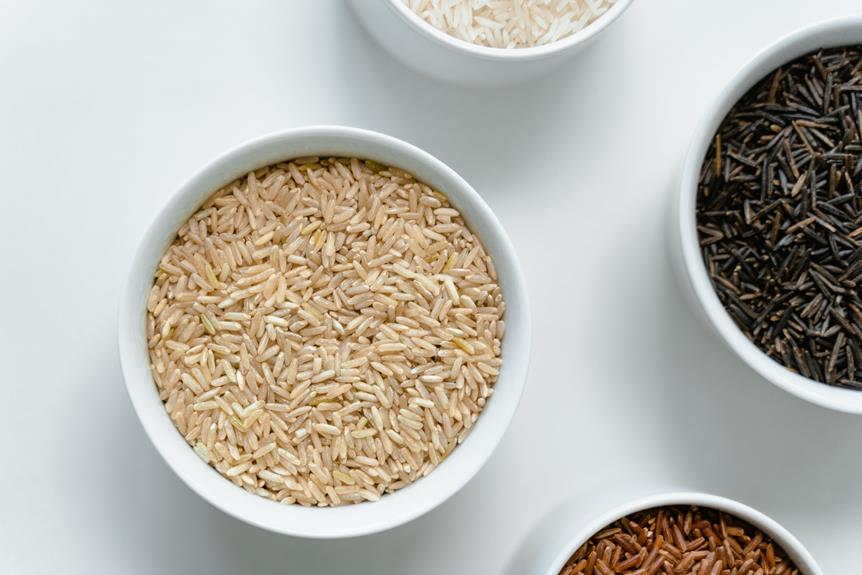You know that incorporating dietary fiber into your daily meals is important for your overall health. But have you ever wondered how exactly it influences your gut bacteria? Well, the truth is, dietary fiber plays a crucial role in shaping the composition of your gut microbiota. But it doesn't end there. The way fiber is fermented in your gut has a direct impact on the growth and activity of different types of bacteria, some of which can be beneficial for your digestive health. So, let's dig deeper into this fascinating relationship between dietary fiber and your gut bacteria, and discover the remarkable effects it has on your well-being.
Key Takeaways
- Dietary fiber promotes the growth of beneficial gut bacteria, supporting a healthy gut.
- Fiber fermentation by gut bacteria produces short-chain fatty acids, which have anti-inflammatory properties and enhance gut barrier function.
- Consuming fiber-rich foods helps prevent constipation, adds bulk to stool, and supports overall digestive health.
- Research supports the importance of dietary fiber in maintaining a diverse gut microbiota and lowering the risk of gastrointestinal diseases.
Importance of Dietary Fiber
Dietary fiber plays a crucial role in maintaining a healthy gut by promoting regular bowel movements and supporting the growth of beneficial gut bacteria. Incorporating fiber-rich foods into your diet is essential for optimal gut health.
One of the primary benefits of dietary fiber is its ability to promote regular bowel movements. Fiber adds bulk to your stool, making it easier to pass through your digestive system. This helps prevent constipation and ensures that waste is eliminated from your body efficiently. By keeping your bowel movements regular, fiber helps maintain a healthy gut and prevents discomfort.
Furthermore, dietary fiber acts as a prebiotic, nourishing the beneficial bacteria in your gut. These bacteria play a vital role in maintaining a healthy digestive system and overall well-being. Fiber serves as a food source for these bacteria, allowing them to thrive and carry out important functions. When the beneficial gut bacteria are well-nourished, they can better support your immune system, improve nutrient absorption, and produce essential vitamins.
Incorporating fiber into your diet is relatively easy. Whole grains, fruits, vegetables, legumes, and nuts are all excellent sources of dietary fiber. Aim to include a variety of these foods in your meals to ensure you're getting a good mix of soluble and insoluble fiber. Soluble fiber dissolves in water and forms a gel-like substance, while insoluble fiber adds bulk to your stool. Both types are important for maintaining a healthy gut.
Mechanism of Fiber Fermentation
To understand how dietary fiber promotes gut health, it is important to delve into the mechanism of fiber fermentation. When you consume dietary fiber, it enters your digestive system and undergoes a process called fermentation. During fermentation, the complex carbohydrates in fiber are broken down by the bacteria in your gut into smaller, more easily digestible compounds. This process has several important effects on your gut health.
To help you visualize the mechanism of fiber fermentation, let's take a look at the following table:
| Mechanism of Fiber Fermentation |
|---|
| Increase in gut bacteria |
| Production of short-chain fatty acids |
| Regulation of pH levels in the colon |
| Enhanced gut barrier function |
The increase in gut bacteria is a key outcome of fiber fermentation. As the bacteria break down the fiber, their population grows, leading to a more diverse and balanced microbiota. This is beneficial because a healthy gut microbiota is associated with improved digestion, nutrient absorption, and immune function.
Another significant result of fiber fermentation is the production of short-chain fatty acids (SCFAs). SCFAs, such as butyrate, acetate, and propionate, are important fuel sources for the cells lining your colon. They help maintain the integrity of the gut barrier, reduce inflammation, and support overall gut health.
Fiber fermentation also plays a role in regulating pH levels in the colon. The production of SCFAs during fermentation can lower the pH, creating an acidic environment that is unfavorable for the growth of harmful bacteria. This helps maintain a healthy balance of gut bacteria and prevents the overgrowth of pathogenic organisms.
Lastly, fiber fermentation enhances gut barrier function. The SCFAs produced during fermentation help strengthen the gut barrier, preventing the entry of harmful substances into the bloodstream and reducing the risk of gut-related diseases.
Impact on Gut Microbiota
The impact of fiber fermentation on gut microbiota is significant. When you consume dietary fiber, it passes through your digestive system largely unchanged until it reaches your colon. Once in the colon, the fiber serves as a food source for the trillions of bacteria that reside there. These bacteria have the capability to break down and ferment the fiber, producing beneficial byproducts such as short-chain fatty acids (SCFAs).
SCFAs play a crucial role in maintaining the health and balance of your gut microbiota. They provide a source of energy for the cells lining your colon, helping to keep the gut lining healthy and functioning properly. Additionally, SCFAs have anti-inflammatory properties, which can help to reduce inflammation in the gut and prevent the development of chronic diseases such as inflammatory bowel disease.
Furthermore, the fermentation of fiber also promotes the growth of beneficial bacteria in your gut. These beneficial bacteria, such as Bifidobacterium and Lactobacillus species, help to maintain a healthy gut environment by crowding out harmful bacteria and producing antimicrobial compounds that help to protect against pathogens.
In addition to promoting the growth of beneficial bacteria, fiber fermentation can also increase the diversity of your gut microbiota. A diverse gut microbiota is associated with better overall health, as it is believed to be more resilient to disturbances and better able to perform its various functions.
Role in Promoting Beneficial Bacteria
Consuming dietary fiber promotes the growth of beneficial bacteria in your gut. These beneficial bacteria, also known as probiotics, play a crucial role in maintaining your overall health. When you consume dietary fiber, it travels through your digestive system largely undigested. As it reaches your colon, it becomes a valuable food source for the beneficial bacteria residing there.
The beneficial bacteria in your gut ferment the dietary fiber, breaking it down into short-chain fatty acids (SCFAs). These SCFAs provide nourishment to the cells lining your gut and contribute to a healthy gut environment. They also have anti-inflammatory properties and help regulate your immune system.
One of the key ways in which dietary fiber promotes the growth of beneficial bacteria is by increasing their numbers. Fiber acts as a prebiotic, which means it serves as a food source specifically for the beneficial bacteria in your gut. By providing them with the necessary nutrients, fiber helps these bacteria thrive and multiply.
Moreover, dietary fiber stimulates the production of beneficial bacteria. It encourages the growth of specific strains, such as Bifidobacteria and Lactobacillus, which are known for their health-promoting effects. These strains help maintain a balanced gut microbiota and contribute to various aspects of your health, including digestion, nutrient absorption, and immune function.
Effects on Digestive Health
Dietary fiber has a significant impact on the health of your digestive system. Consuming an adequate amount of fiber can help prevent and alleviate various digestive issues. One of the primary benefits of fiber is its ability to promote regularity and prevent constipation. Fiber adds bulk to your stool, making it easier to pass through your intestines and preventing the buildup of waste. This can help prevent discomfort and bloating, allowing for smoother digestion.
Furthermore, fiber plays a crucial role in maintaining a healthy gut environment. It acts as a prebiotic, providing nourishment for the beneficial bacteria in your gut. These bacteria, known as probiotics, help break down dietary fiber into short-chain fatty acids. These fatty acids provide energy for the cells that line your colon, promoting their overall health and function.
In addition to promoting regularity and supporting gut bacteria, dietary fiber can also help prevent gastrointestinal diseases. Research suggests that a high-fiber diet may lower the risk of developing conditions such as diverticulosis, hemorrhoids, and colorectal cancer. Fiber helps maintain bowel regularity, reducing the pressure and strain on your intestines, which can contribute to the development of these diseases.
To reap the benefits of dietary fiber for your digestive health, it is essential to consume a variety of fiber-rich foods. Good sources of fiber include fruits, vegetables, whole grains, legumes, and nuts. Aim to incorporate these foods into your diet regularly and gradually increase your fiber intake to prevent any potential digestive discomfort.
Frequently Asked Questions
Does Dietary Fiber Have Any Impact on the Production of Short-Chain Fatty Acids by Gut Bacteria?
Dietary fiber does have an impact on the production of short-chain fatty acids by your gut bacteria. When you consume fiber-rich foods, your gut bacteria ferment the fiber and produce short-chain fatty acids as a byproduct. These fatty acids have numerous benefits for your health, such as providing energy for your colon cells and promoting a healthy gut environment. So, including enough dietary fiber in your diet can positively influence the production of these important fatty acids.
Can a Diet High in Dietary Fiber Help Prevent the Overgrowth of Harmful Bacteria in the Gut?
A diet high in dietary fiber can help prevent the overgrowth of harmful bacteria in your gut. By consuming fiber-rich foods, you provide the necessary fuel for beneficial bacteria to thrive, crowding out the harmful ones. The fiber acts as a prebiotic, stimulating the growth of good bacteria and promoting a healthy balance in your gut microbiome. This can have a positive impact on your overall digestive health and immune system function.
Is There a Recommended Daily Intake of Dietary Fiber for Optimal Gut Health?
For optimal gut health, it is recommended that you have a daily intake of dietary fiber. This helps to support the growth and diversity of beneficial bacteria in your gut. By consuming enough fiber, you can create an environment that promotes the growth of these good bacteria and prevents the overgrowth of harmful ones. Aim to include a variety of fiber-rich foods in your diet, such as fruits, vegetables, whole grains, and legumes, to maintain a healthy gut microbiome.
Does the Type of Dietary Fiber Consumed Affect Its Impact on Gut Bacteria and Digestive Health?
Does the type of dietary fiber you consume affect its impact on your gut bacteria and digestive health? The type of dietary fiber you choose can indeed have an effect on your gut bacteria and overall digestive health. Different types of fiber, such as soluble and insoluble, can have varying effects on the composition and diversity of your gut microbiota. It is important to consider incorporating a variety of fiber-rich foods into your diet to support a healthy gut and promote optimal digestive function.
Can Increasing Dietary Fiber Intake Help Alleviate Symptoms of Digestive Disorders, Such as Irritable Bowel Syndrome or Inflammatory Bowel Disease?
Increasing your dietary fiber intake can potentially alleviate symptoms of digestive disorders such as irritable bowel syndrome or inflammatory bowel disease. The type of dietary fiber consumed may influence its impact on gut bacteria and digestive health. By incorporating more fiber-rich foods into your diet, you can help promote a healthier gut environment and improve digestion. However, it is important to consult with a healthcare professional to determine the best approach for managing your specific digestive disorder.




